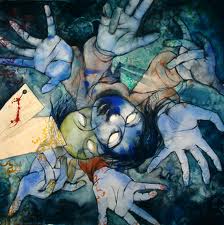You did it! You did it!
You pulled the story out of yourself for however many weeks, months, or years it took, and now it stretches before you in its entirety. No longer confined to the imaginative terrain between the walls of your skull; rather, a new-formed entity ready to suck air into its lungs and squall forth a noise that will attract readers to its existence, enticing them to be amazed.
But…no.
Not yet.
You know it needs a little more work.
So you do what you consider ‘editing.’ You kick the typos to the curb and smooth the rough spots so no one will stumble over them. It’s a quick, triumphant jaunt through your creation, reinforcing your belief in its value, fanning to feverish pitch your eager anticipation of a glorious reception by agents.
But just as your mind is ready to break free and begin considering the perfect accompanying query, you realize there’s something else out there. You can hear it approaching, crashing its way through bracken and furze. It’s trudging toward you with the geriatric gait of an arthritic sloth. It’s so close you can feel it sapping all that energy geared toward spewing your manuscript out into agent-world.
It’s here.
It’s the Slow Edit.
You could evade it. It is possible to dodge its plodding presence and speed off into the distance. But the little, niggling voice that never lies tells you if you do, you’ll be speeding off all by your lonesome, ending up in that wasteland where agents never go.
They will know if you haven’t honored the Slow Edit, bending your knee and lowering your head before its ponderous girth.
Just do it.
Put on the brakes.
Settle in for the long haul and…
…before you know it, you’ll be down the rabbit hole.
You will study each word, each sentence. You will debate syntax, placement, order. Your brain will delve into a lifetime’s accumulation of vocabulary, searching for just the right nuance, savor, syllable. It will take multiple sessions to wade through your story, because your brain will be overwhelmed after several hours of unremitting effort. It will offer up optional wording with thesauric profusion, making it impossible to identify the best choice. It will begin to invent words like ‘thesauric.’
You’ll have to take a break, regroup, and tackle the beast when your literary awareness has regained its elasticity. Again. And again.
But in the end you’ll have a tale that doesn’t splay itself out before the reader, offering up its entrails in the hope that someone will find it salvageable. You’ll have a streamlined bullet-to-the-brain, can’t-stop-reading-it work.
Thanks to that ugly, paunchy, unwelcome creature. The Slow Edit.
All done? Feel better? Recognize the worth? Glad you did it?
Good.
Now, go back to the beginning and do it again.








You must be logged in to post a comment.